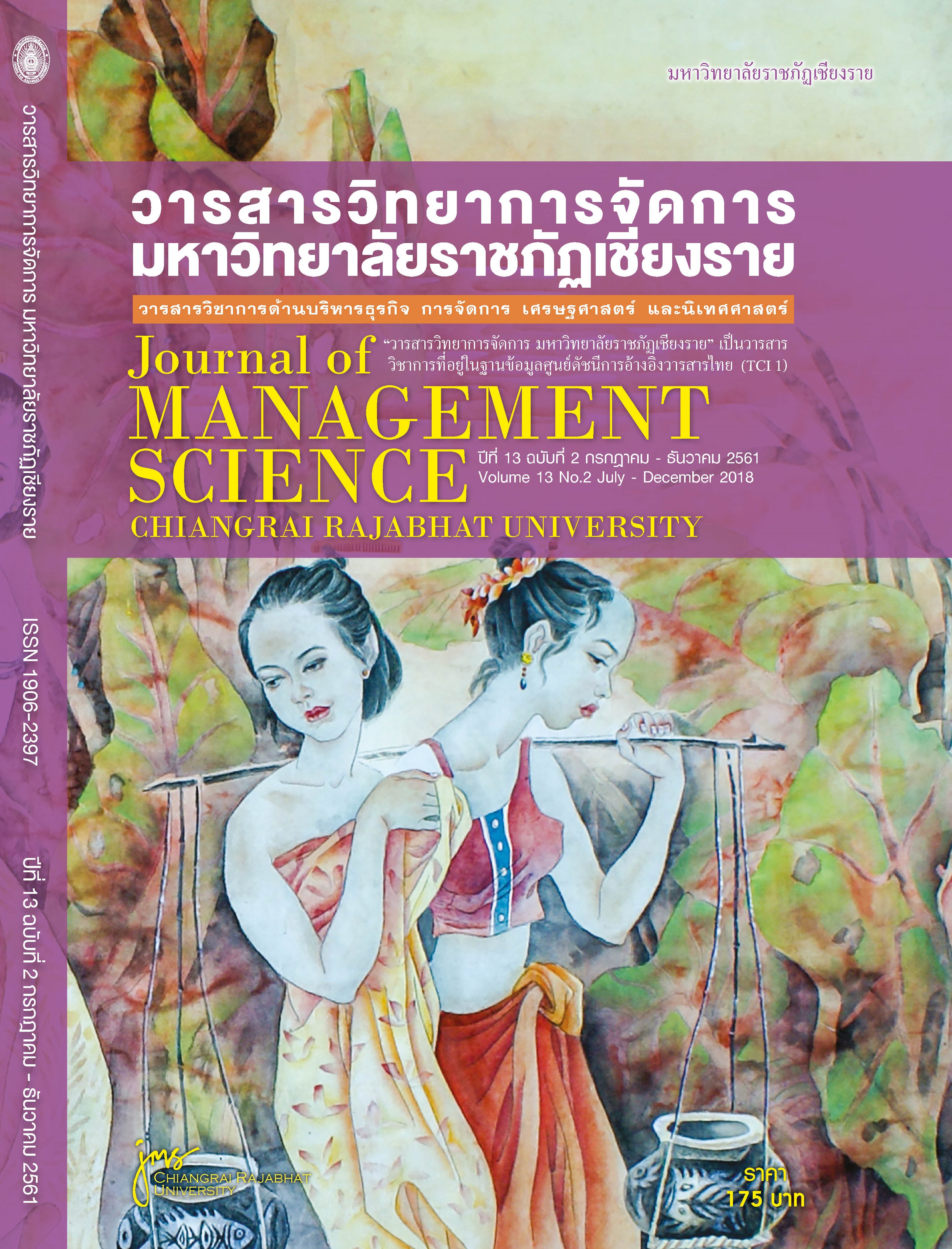Promotion of Local Wisdom in Community-based Tourism Management in Ethnic Communities in the Lanna Civilization Cluster
Main Article Content
Abstract
This research and development project aims to: 1) develop the travelling routes of community based tourism (CBT) basing on the tourism resources, 2) analyses of problems and obstacles of CBT management 3) analyses of tourism stakeholders demand and knowledge on CBT management; 4) enhance capacity building of human resources in CBT management and; facilitate marketing networks of CBT. Qualitative research approach was applied for data collection including: observations, interviews, focus groups and participatory rural appraisal with tourism stakeholders including public sectors, private sectors and local communities. Content analysis and descriptive analysis was employed for data analyzes.
The study revealed that 1) seven types of tourism routes are identified as tourism linkage on R3A and R3B. These included Ecotourism, Agro-tourism, Heritage tourism, Buddhism tourism, Ethnic tourism, Gastronomy tourism, and Culture based tourism. 2) The main problems and obstacles of CBT management are lacking of; amenity, accessibility, cross cultural communication and understanding and government support in addition to tourism stakeholders are lacking of knowledge and skills on tourism management. 3) Tourism stakeholders wish to gain knowledge on sustainable CBT management, types of CBT, management of visitor and hospitality and adaptation of information technology for marketing. 4) Enhancing tourism stakeholders’ capacity building on CBT management and related issues by application of local wisdom. This activity was conducted via workshop and training. Thus, tourism stakeholders gained better knowledge and related skills and it is in a good level. Thus, they can apply local wisdom in development of tourism products and activities. 5) Marketing network was operated using on line and off line channels, including VDO, brochure, seminar and tourism promotion at 5 Chiangs of both informal and formal tourism networks in the GMS countries
Article Details
Views and opinions expressed in the journal do not necessarily reflect those of the editors.
References
Suwannaphimol, K. (2005). Tourist Definition. Bangkok: Pearson Education Indochina. (in Thai).
Paungphet, K., KlaHan, S., Panyapong, W., Kathintad, T. (2012). Management and Participation for Cultural Tourism Development : A Case Study of Thai Phuan Ethnic Group, Ban Mi District, Lop Buri Province. Rompluek Journal, Kerk University. 30(2). (in Thai).
Suthiudom, J., Kulprasoot, P., and Sujirapanya, A. (2007). Consuming Behaviors of Sustainable Nature-Based Tourism among Thai and Foreign Tourists in Ko Chang Area, Ko Chang Sub-District, Trat Province. Full Paper. Bangkok: The Thailand Research Fund (TRF). (in Thai).
Pimolsompong, C. (2005). Planning and Development of Tourism Marketing. Bangkok: Kasetsart University Press. (in Thai).
Sompanyathiwong, C. & Wanlapachai, A. (2016). The study of preparing for the cultural tourism of ethnic Mong in Ban Toobkho Tambon Kok Sathon, Loei. Western University Research Journal of Humanities and Social Science. 2(3). (in Thai).
Booparkob ,Y., Wongmanee J., Khetjenkarn S., Sawangdee Y. (2017). The Role of Local Cuisines in Creative Tourism Process: A Case Study of Lao Khrang Ethnic Group in Chai Nat Province. Dusit Thani College Journal, 11(Special). (in Thai).
Ployjun, D. (2016). Cultural Capital of The Hmong Hill Tribe with Strategies to Promote Creative Tourism. The Journal of Social Communication Innovation. 4(1), 6-17. (in Thai).
Sitikarn, B. (2014). Tourism Planning: From theory to practice.1st Edition. Chiang Mai:Santipab Pack-Print. (in Thai)
Sitikarn, B. et. al. (2015). Report on Strategic Management of Sustainable Trans-boundary Tourism in R3A and R3B Route. Bangkok: Thailand Research Fund. (in Thai)
Tunming, P. (2017). Guideline for the Development of Tai Dam Ethnic Group Tourism, Ban Na Pa Nat, Chiang Khan District, Loei Province. International conference at Phechaboon Rajabhat University. 4th March 10, 539-547. (in Thai).
Khiaomaneerat, P., Petchkam, S., Vaseenonta, C. and Singyabuth, S. (2018). Ban Phu: The Phutai Ethnic Identity and Development Administration In the Context of Sustainable Cultural Tourism. Nakon Phanom University Journal. 6(1), 17-25. (in Thai).
Thepphawan, P. (2011). Strategic Human Resource Management. Bangkok: SE-EDUCATION. (in Thai).
Jedaman, P. (2013). Human Resource Development. Retrieved September 26, 2016, from https://www.oknation.net/blog/jedaman/2013/03/ 29/entry-1. (in Thai).
Royal Thai Government Gazette. (2015). Ministerial Regulation on Tourism Development Clusters on Royal Coast,Active Beach, Andaman, Lanna Culture, South E-San Civilization,B.E.2558 (2015). 132(22a), 18-20. (in Thai).
Boonyasatith, W., Peantam, C. and Silpanlang, T. (2017). The Historical Development of LaoWiang People in U Thong District, Suphanburi Province. Journal of Nakhonratchasima College. 11(1), 26-38. (in Thai).
Jaisabai, S. & Jaisabai, J. (2016). The Development of Cultural Tourism Attraction : A Case Study of the Ethnic Group in Nakhon Phanom Province. The 1st International conference, Ratchathani University. July 29, 1176-1189. (in Thai).
Sereerat, S. et al. (2000). Principles of Marketing. Bangkok: Diamond in Business World. (in Thai).


